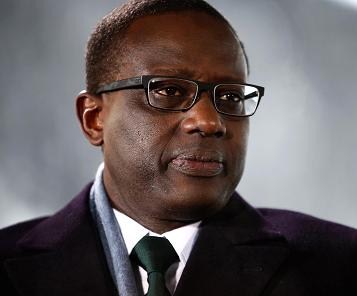Credit Suisse appoints Franco-Ivorian Tidjane Thiam as new CEO

By Alan Green
Franco-Ivorian business leader Tidjane Thiam will become the new chief executive officer of the Swiss bank Credit Suisse in June. The announcement was made on Tuesday by the Swiss financial institution and the U.K-based mega insurer Prudential currently headed by Thiam, 52. Credit Suisse’s shares surged 7.5 percent at the opening of Tuesday session in reaction to the announcement. Thiam will take over from outgoing CEO Brady Dougan who has headed the Swiss lender for eight years.
Credit Suisse chairman Urs Rohner said on Tuesday: “With Tidjane Thiam, a strong and distinguished leader with an impressive track record in the global financial services industry will take the helm of our bank.” For his part, Paul Manduca, chairman of Prudential, stated in a press release issued on Tuesday: “Although the board will be sorry to see him go, we understand his desire to take on a new challenge with another global leader in a different part of the financial services sector, headquartered in Switzerland, and we wish him every success in his new role.” Manduca also hailed Thiam as “an exceptional leader,” stressing his legacy of steering the company through the financial crisis and capitalizing on the new, high-growth Asian markets.
It’s all credit earned by the Franco-Ivorian business leader (who, by the way, speaks excellent English in addition to French, his native language). Thiam, who joined Prudential in March 2009, will leave an indelible mark on a company whose shares have risen over 150 percent during his tenure. Prudential disclosed on Tuesday that its full-year results showed a 14 percent rise in operating profit.
It’s believed that Credit Suisse has let go Brady Dougan, a 55-year-old American who has served as chief executive for eight years, with a total of 25 years in the company–reportedly the highest-paid banker in the world with an annual salary topping $91 millions–due to his failure to reform the bank fast enough to tap into the multi-millionaires club in Asia, an area where Thiam has succeeded at Prudential.
It must be recalled that Credit Suisse faced quite a few other challenges under Dougan–prompting calls for his resignation–when Credit Suisse reached a $2.5 billion settlement last year with the United States for helping Americans evade taxes via secret bank accounts. Though Brady was backed by the board of directors in that deal, the after-taste is quite fresh.
Credit Suisse, headquartered in Zurick, Switzerland, was founded in 1856 by Alfred Escher under the name Schweizerische Kreditanstalt (SKA, in English Swiss Credit Institution) in order to fund the development of Switzerland’s rail system. It has developed into a multinational financial service holding company that operates the Credit Suisse Bank and other financial service investments. The company is organized as a stock corporation with four divisions: Investment Banking, Private Banking, Asset Management, and a Shared Services Group that provides marketing and support to the other three divisions.
Thiam’s appointment prompted analysts to point out his lack of banking experience, but experts in the field quickly remarked that his legacy at Prudential and his overall brilliant career make him suitable for the high-power job. Analysts also speculated that Thiam’s background in insurance and asset management are probably the indication that Credit Suisse is embarking on a gradual move away from investment banking. Brady, despite a positive result of over 2 billion euros last year, was criticized for sticking with an investment banking strategy that many view as too risky, given the tougher capital rules Swiss politicians and regulators have imposed on their banks. The newly-appointed CEO’s past experience in politics, other suggest, is also an asset.
Tidjane Thiam was born on July 29, 1962 in Cote d’Ivoire, the son of journalist and former Franco-Ivorian information minister of Cote d’Ivoire, Amadou Thiam, originally from Senegal and married to an Ivorian woman who was a member the family of Cote d’Ivoire’s founding father Felix Houphouet-Boigny. Tidjane Thiam studied advanced mathematics and physics at École Polytechnique and École Nationale Supérieure des Mines in Paris. He holds an MBA from INSEAD, a graduate business school with campuses in several world’s regions.
He joined the Paris office of the London-based management and consultants firm McKinsey & Company in 1986. He left that position in 1994 to become chief executive officer of the National Bureau for Technical Studies (BNETD) in his native Cote d’Ivoire, reporting directly to then-Prime Minister Kablan Duncan or the head of state, Henri Konan Bedie. In 1998, at age 36, he was appointed Minister of Planning and Development, and Chairman of BNETD, only to have to leave the country following the December 1999 coup that toppled President Bedie. He headed back to McKinsey where he worked from 2000 to 2002. He later held a senior executive position at Aviva, the London-based multinational insurance company, before being recruited by another insurer, Prudential. His appointment as Prudential’s chief executive in 2009 made him the first black to lead a FTSE 100 company (the 100 companies listed on the London Stock Exchange Group with the highest market capitalization.)
Then came on Tuesday his appointment as one of the handful of global CEOs. Tidjane Thiam is hailed as one of the brightest African intellectuals of our time.


